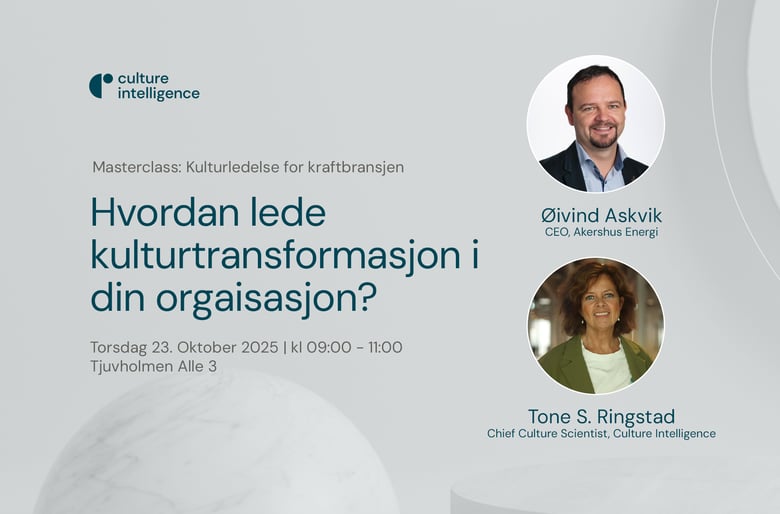Geopolitical surprises in 2025 have intensified business uncertainty, complexity, and volatility. The global economic and societal trends with sweeping tariffs, trade imbalances, global protests, natural disasters, rising tension and war initiate seismic disturbance globally. It accounts for 43% of the variation in net profit margins (MIT, 2025)
There are unfortunately now very few evidence-based ways for preparation, no previous strategies to use or published articles to learn from. We are in unprecedented territory. The question is: What does this mean for our business? And to more specific, for our business culture?
Values foundation becomes more important
This turbulence is having a real impact on business. In times of uncertainty, the strategic horizon becomes shorter, and the vision becomes more blurry. The hard reality is that safe and securing conditions become more important, resulting in values like financial and societal security, belonging and care increase in priority.
In a situation where we need more security, we need to rethink business practices. To adjust, we need a revised strategy and a new visionary and resilient business culture to back it up. The paradox, however, is that even if it is needed, it is harder for us to do. So, there is a potential gap between what the organisational culture is built by, and what the organisation culture needs.
Business culture is under attack
To try to identify and measure this culture gap, find out what kind of impact, and how strong, we made a comparison in our culture data surveyed from an average Nordic population between Q1 2024 and Q1 2025. From our culture normgroup data, we pulled out a selection of 900 people´s values priorities, spread in Q12024 and in Q12025. Then we analysed what had significantly changed.

What we see is that selected values from the foundational area have increased and selected developmental and creative values have decreased. Our hypothesis is that a values shift towards a more foundational mindset has started.
The values Financial security, Security and Belonging have increased. The value Life balance is one of the most important values in this year’s norm group, and it has increased since last year. These values have become more important to people. The values of Innovation, Sustainability and Trust, however, have declined. That means we are no longer as focused on this as we were last year. This may also show up as an increasing focus on problems more than solutions, feeling of exhaustion, lack of willingness to take on more or different tasks or a general resistance to change. It is also therefore likely that people in the organisation become more concerned with their next pay check and how the company will survive in this chaotic time, than creating and innovating the next big strategic move that the company needs to ride through the storm.
The impact of this shift may be that not only the quality of operations will be affected, but people may also incrementally change their collaborative style and how they work with each other. The risk is misalignments in the organisational performance that will challenge engagement, profitability and eventually growth.
The way to navigate with your culture
Business culture is a human system, built by values. Values are partly unconscious and have traditionally been hard to measure and monitor over time. As values also are a priority game, you don’t have equally strong focus on all your values, your brain simply puts priority to 8-10 to be sent to action (Hall, B.P.,1994). When foundational values like financial security, belonging and security kicks in, people in a team need each other more, need confirmation and support more, need to feel included more, but the change willingness to develop together may be more difficult. But only partly expressed and conscious.
3 steps forward for Modern Mindset Leaders
Your role as a leader may be challenging in this period; you will have to try to make conscious culture shifts. Laser focus on what your culture actually contains will be essential. To do this effectively, modern mindset leaders will move in three steps
1. Understand and make sense of your actual current culture
All cultures respond differently, because they are different and have different values to start with. Knowing what you have is the baseline. But if you see a slightly new behavioural pattern, new reflections over the workday or comments about a heavier workload, this may be the unconscious response. Paying attention to the emotional part of leadership becomes more important, and listening, empathizing and responding to uncertainty should have more priority.
2. Build more resiliency-driven values in your culture
Talk about new values you need and make culture analytics a part of the leadership strategy. Which are the values that will help you through the storm? Which are the values you need to strengthen? What are the best teams in the company doing and what part of their culture can we learn from?
3. Building the parts you need by engaging in learning and growth.
Values change in small steps, often unconsciously. Your leadership focus needs to be strengthened in a direction of developing you. Working in an innovative way through the current challenges is critical. and monitor along the way is essential. You want to expand your horizon to see longer than just the next month's possible challenge. Defining the values that will help you to navigate through the turbulence and stick to them over time even if it is shaky around you.
Culture is not the soft side of business, and it is not only for the sunny days. In fact, culture is more critical for hard times. As Jim Collins in Built to Last defines; stick to core AND stimulate progress will work overtime. Building the culture you need at any given time is critical, but now it is lifesaving. Rebuilding your culture with checking in on both resilience building and agility training, while ensuring the foundational values are in balance is the new leadership role.
.jpg?width=1280&height=719&name=1749887048684%20(1).jpg)


